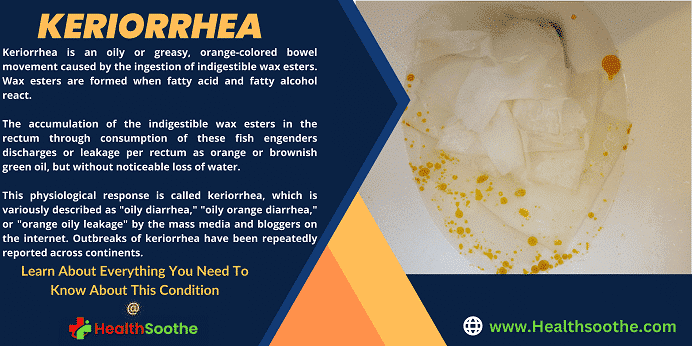There are some fishes like the oilfish and escolar that have indigestible wax esters and when we eat these indigestible wax esters, it causes the removal or defecation of oily, orange-colored feces.Ever wondered what is responsible for this? Doctors called it keriorrhea. But how does it come to be? What is in the fish that is responsible for this keriorrhea? Or what really makes up that wax ester in those fishes?
In this article, we will answer these questions and more. Also, we will look at keriorrhea in more detail, as well as its symptoms, causes, treatments, and prevention.
We proceed.
Keriorrhea is an oily or greasy, orange-colored bowel movement caused by the ingestion of indigestible wax esters [mfn]https://en.wikipedia.org/wiki/Keriorrhea[/mfn] Wax esters are formed when fatty acid and fatty alcohol react.
Wax esters are abundant in the bodies of fish of the Gempylidae family. These fish are frequently referred to as snake mackerels, and they contain oilfish and escolar fish. When these fish are consumed, wax esters may collect in the rectum, resulting in the discharge of orange, oily feces.
Many deep-sea fishes store large amounts of wax esters in their body for buoyancy control. Some of them are frequently caught as by-catch of tuna and other fishes. The most noteworthy ones include escolar and oilfish.
The accumulation of the indigestible wax esters in the rectum through consumption of these fish engenders discharges or leakage per rectum as orange or brownish green oil, but without noticeable loss of water.
This physiological response is called keriorrhea, which is variously described as “oily diarrhea,” “oily orange diarrhea,” or “orange oily leakage” by the mass media and bloggers on the internet. Outbreaks of keriorrhea have been repeatedly reported across continents.
Symptoms of Keriorrhea
Keriorrhea symptoms generally appear after a few hours of swallowing oilfish or escolar fish and might linger for many days.
Keriorrhea is distinguished by an oily, orange bowel output. Because oil is less thick than water, this bowel movement will look like an orange oil that sits above the water in the toilet. Keriorrhea has a distinct mineral oil fragrance, according to some individuals. A person may discharge excrement with the oil at times. Sometimes they just pass the oil.
Other symptoms associated with keriorrhea include:
- Stomach aches
- Nausea
- Diarrhea
- Vomiting
- Stomach gurgles
- Headaches
- Anal leaking of feces
Causes of Keriorrhea
Keriorrhea is caused by consuming wax esters in oilfish or escolar fish. Because both species are members of the Gempylidae family, some may regard the wax esters as gempylotoxins and also the disease as gempylid fish poisoning.
The precise amount of gempylotoxins that induces keriorrhea is unknown and may vary based on the susceptibility of the individual. According to research, wax esters account for over 20% of the body mass of Gempylidae fish.
The explanation for this is that these fish are unable to metabolize the wax esters found in their normal diet. Wax esters build up in the fish’s body, such as the skin and muscular tissue.
Wax esters are compounds made up of fatty acids and fatty alcohol. These items are inedible and nonabsorbable. As a consequence, the gempylotoxins have a laxative action once within the colon, resulting in greasy diarrhea.
Fish are occasionally mislabeled as other sorts of fish by sellers. In other situations, the fish may go by another name, like gemfish, butterfish, or rudderfish.
In a 2018 research letter, healthcare practitioners who treated three keriorrhea patients reported that each had just ingested raw fish (sushi) before experiencing their symptoms.
Italy and Japan prohibit the selling of escolar fish in their respective countries. The Food and Drug Administration (FDA) recommends against importing and selling oilfish and escolar fish.
Treatment of Keriorrhea
Symptoms usually fade after 24-72 hours, however, they might continue up to 90 hours in certain circumstances. Keriorrhea patients are unlikely to need therapy or hospitalization.[mfn] https://pubmed.ncbi.nlm.nih.gov/19595384/[/mfn]
To encourage healing, a person suffering from keriorrhea may desire to take the following steps:
- Resting: Consider taking time off from work and being at home. They should be informed that bowel motions might be unexpected and urgent if they need to go out.
- Drinking lots of fluids: Keriorrhea patients are in danger of being dehydrated. Individuals should continue to consume lots of fluids while avoiding alcohol and caffeine.
- Slowly reintroduce foods: There has been little study on which foods should be avoided while suffering from keriorrhea. However, based on the typical advice for what to eat while suffering from diarrhea, they may want to avoid big meals in favor of modest quantities of bland foods.
Other Possible Causes of Oily Feces You Should Know About
Steatorrhea is another illness that may cause oily bowel motions. This word refers to feces that are high in fat. Stools of this kind may seem greasy, colorless, and thick. They may also have a bad odor.
Steatorrhea, like keriorrhea, may create a greasy anal leakage, and an individual may see oil on the surface of the water in the toilet bowl.
Foods
Steatorrhea may be caused by eating meals or foods heavy in fat, potassium, or fiber. These might include:
- Oily, high-fat fish
- Meals that are rich in trans fats
- Nuts
Medical problems
Some medical problems may impair nutrition absorption in the stomach. Steatorrhea may be caused by poor fat absorption. Steatorrhea may be caused by a variety of disorders, including:
- Celiac illness: When an individual with celiac disease eats gluten, the body responds by attacking its own tissues in the digestive system and stomach. Steatorrhea may result from this reaction because it affects nutrition absorption.
- Chronic pancreatitis: The pancreas is an organ that promotes digestion. It may get inflamed and cease operating correctly at times. This malfunction may cause poor digestion and problems absorbing lipids, resulting in steatorrhea.
- Crohn’s disease: This chronic ailment causes gut inflammation. This inflammation may disrupt absorption pathways, resulting in steatorrhea.
Can Liver Problems Cause Keriorrhea (Orange Stools)?
Digestive problems can cause orange stools. If your stool isn’t absorbing enough bile, it may be light gray or tan. This can happen when you have a short-term case of diarrhea or if you have a more serious liver condition. Sometimes babies have blocked bile ducts, which leads to loose orange or grayish stool.
Is Keriorrhea Serious?

Generally, not absorbing enough bile or not producing enough bile can cause orange stools. Medical conditions related to bile issues include short-term diarrhea, blocked bile ducts, irritable bowel syndrome (IBS), short bowel syndrome (SBS), gallstones, inflammation, cysts, and tumors.
When Should You Visit a Doctor Concerning Keriorrhea?
Most patients with keriorrhea will recover in a few days and will not need to consult a doctor. [mfn]https://www.medicalnewstoday.com/articles/keriorrhea[/mfn]However, if a person has frequent oily bowel movements, they may develop steatorrhea. Consider consulting a doctor who can do tests to establish the underlying problem.
Summary
Keriorrhea patients will have oily orange bowel motions. The illness is usually caused by swallowing indigestible wax esters found in oilfish and escolar fish. Although it may be inconvenient and unpleasant, a person suffering from keriorrhea will most likely heal at home without the need for medical attention.
Many deep-sea fishes store large amounts of wax esters in their body for buoyancy control. Some of them are frequently caught as by-catch of tuna and other fishes. The most noteworthy ones include escolar and oilfish.
The accumulation of the indigestible wax esters in the rectum through consumption of these fish engenders discharges or leakage per rectum as orange or brownish green oil, but without noticeable loss of water.
This physiological response is called keriorrhea, which is variously described as “oily diarrhea,” “oily orange diarrhea,” or “orange oily leakage” by the mass media and bloggers on the internet. Outbreaks of keriorrhea have been repeatedly reported across continents.
Additional symptoms including nausea, vomiting, abdominal cramps, and diarrhea were complained by the victims. They are probably due to anxiety or panic when suffering from keriorrhea.
Escolar and oilfish are banned from import and sale in Italy, Japan, and South Korea. Rapid detection of the two fishes is imperative to ensure proper labeling and safeguarding of the public before and after any keriorrhea outbreak.





